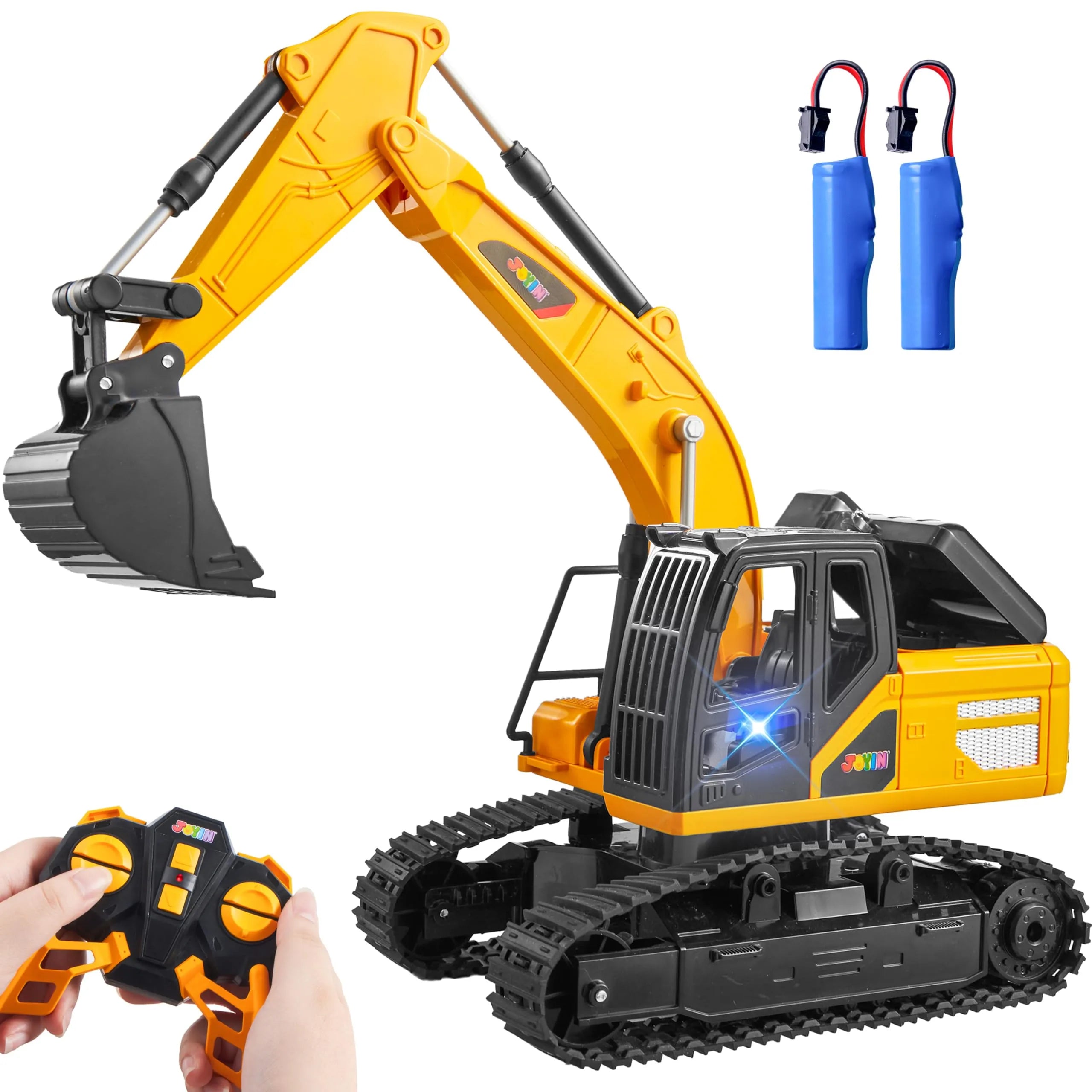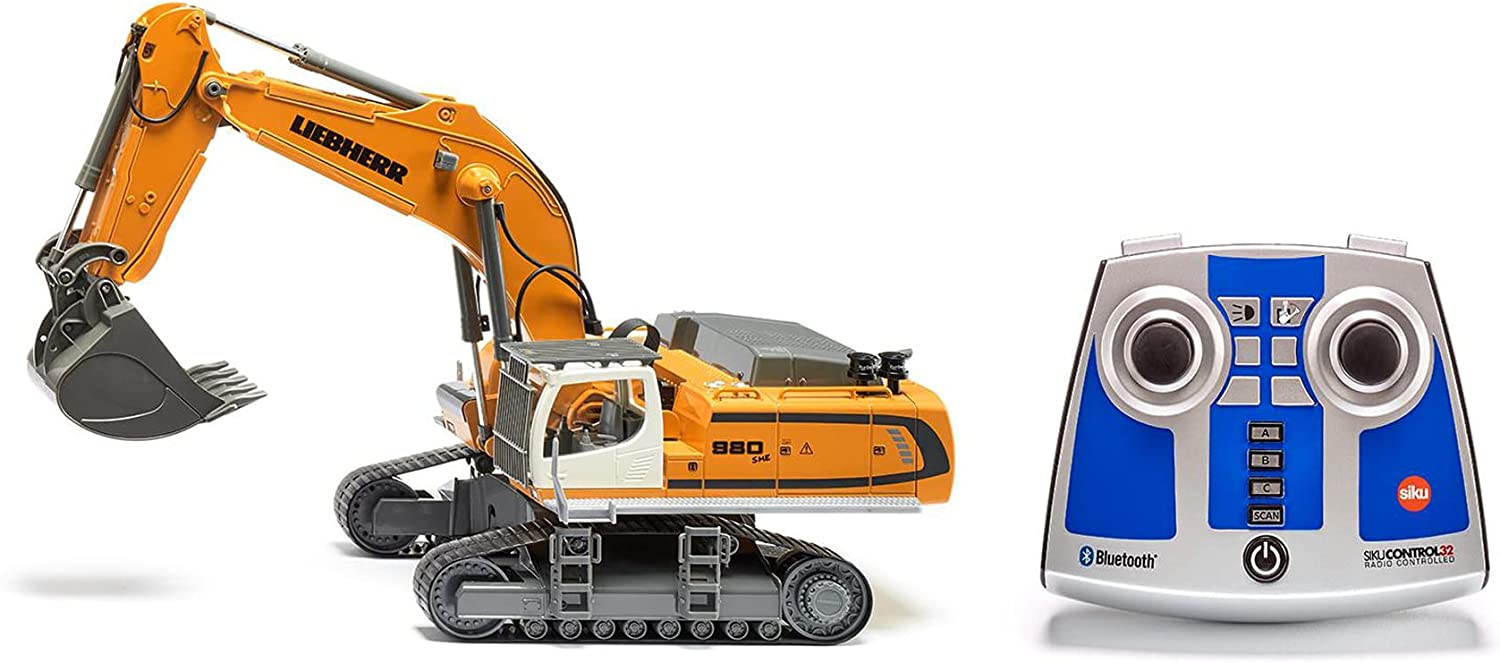What You Need to Know About the Double E Volvo rc excavator for Urban Development
Discover the Significance of Excavator in Modern Building And Construction Projects
Excavators are vital tools in modern construction tasks. Their convenience permits them to do a wide variety of jobs, from excavating and grading to demolition and website prep work. Advanced functions, such as hydraulic attachments and general practitioners, enhance their capacities and effectiveness on task sites. As the market progresses, the significance of excavators expands even much more. Understanding their duty can disclose insights right into the future of building and construction practices. What lies in advance for these makers?
The Adaptability of Excavators in Various Projects
Although excavators are often connected with large-scale building and construction jobs, their adaptability enables them to be made use of in a wide range of applications, from domestic landscape design to energy upkeep. In metropolitan settings, excavators can navigate limited areas to dig foundations for homes or set up water drainage systems. Their capacity to execute fragile tasks makes them perfect for landscape design jobs, where they can dig deep into for fish ponds or plant trees. On top of that, excavators play a crucial duty in energy maintenance, efficiently digging trenches for pipelines or cords without interfering with bordering areas. In farming applications, they help in land clearing and soil preparation. Furthermore, their versatility enables them to be outfitted with different add-ons, improving their performance throughout various tasks. This complex nature of excavators not just enhances different building and construction procedures yet additionally shows their integral duty in modern-day infrastructure advancement and upkeep.
Key Functions and Kinds of Excavators
The conversation on essential functions and sorts of excavators highlights the essential attributes that make these devices important in construction. Numerous excavator types, each made for particular jobs, show their convenience and performance throughout different applications. rc excavator. Recognizing these attributes and categories is vital for optimizing their usage in modern-day construction projects
Excavator Types Introduction
Excavators play an essential function in contemporary construction, offering adaptability and performance across different tasks. These hefty machinery units come in numerous types, each customized for certain applications. The most typical types consist of spider excavators, known for their stability on unequal surface, and rolled excavators, which supply greater movement on smooth surface areas. Tiny excavators are favored for small jobs and tight areas, while long-reach excavators are made for deep excavating. Furthermore, there are customized excavators, such as hydraulic excavators, which enhance power and precision. Each kind includes one-of-a-kind capabilities, making them necessary for jobs varying from excavating and grading to demolition and material handling. Comprehending these variants allows building experts to select the ideal excavator for their task needs.
Trick Includes Explained
Recognizing the essential attributes of excavators improves their efficient application in construction tasks. Excavators are defined by their powerful hydraulic systems, which provide the essential force for digging, lifting, and moving products. Their verbalized arms enable a vast array of activity, helping with precise procedures in constrained areas. Additionally, the range of attachments, such as containers, grapples, and augers, broadens their convenience to fulfill various project requirements. The dimension and weight of excavators additionally add to their security and maneuverability on different surfaces. In addition, advancements in technology have actually brought about the assimilation of GPS and automation, boosting accuracy and performance in excavation tasks. These features collectively place excavators as indispensable tools in contemporary building.
Applications in Building and construction
Changing construction websites, excavators play an essential function across different applications, ranging from property building projects to massive framework advancements. These flexible equipments are furnished for tasks such as excavating foundations, trenching for utilities, and website grading. Various types of excavators, including crawler, rolled, and mini excavators, give certain benefits customized to the task requirements. Crawler excavators master rough surfaces, while wheeled excavators provide mobility on paved surfaces. Small excavators are optimal for restricted areas, making them preferred in urban settings. The effectiveness and power of excavators substantially quicken building processes, guaranteeing timely project conclusion. Their adaptability better enhances their value, permitting building and construction teams to deal with a varied array of obstacles successfully.
Enhancing Efficiency and Efficiency on Task Sites
Making best use of efficiency and productivity on task websites is an important purpose in modern-day building and construction. Excavators play an essential role in attaining this goal by streamlining various tasks. Their capacity to carry out several functions-- such as grading, digging, and training-- minimizes the demand for extra devices, thus saving time and resources.Moreover, excavators boost process by permitting for faster conclusion of tasks. With advanced attributes like hydraulic accessories and general practitioners technology, they can implement specific operations that decrease errors and revamp. This accuracy not only boosts the top quality of work but additionally optimizes product usage, adding to cost savings.The adaptability of excavators permits them to adjust to various website problems, making certain that tasks advance smoothly despite challenges. By incorporating excavators into building and construction processes, groups can significantly increase their overall efficiency, leading to prompt project conclusion and raised productivity.
Security Benefits of Making Use Of Excavators
Excavators greatly improve safety and security on construction websites via improved operator visibility and minimized hand-operated labor threats. By offering operators with a clear sight of their environments, excavators help to stop injuries and crashes. Additionally, the equipment lessens the need for workers to participate in harmful manual jobs, even more advertising a much safer workplace.
Boosted Operator Presence
Although building websites can be disorderly and filled up with prospective risks, improved driver presence plays a crucial role in ensuring safety and security when making use of excavators. Modern excavators are created with large, unhampered windows and strategically put mirrors, permitting operators to maintain a clear view of their surroundings (rc excavator). This enhanced exposure is vital for spotting pedestrians, various other equipment, and numerous obstacles, considerably decreasing the threat of accidents. Furthermore, numerous excavators integrate sophisticated modern technology, such as cameras and sensors, to provide operators with added viewpoints, better boosting recognition. The capacity to see even more clearly not just aids in effective operation but also promotes a more secure work setting, making it simpler for operators to navigate intricate construction sites without jeopardizing security standards
Decreased Manual Work Dangers
When manual work is reduced through the use of excavators, many safety benefits emerge, noticeably improving the health of building and construction employees. Excavators lessen the physical stress related to hefty training and repetitive tasks, effectively reducing the threat of musculoskeletal injuries. By automating procedures such as excavating, grading, and moving materials, they enable workers to keep a much safer distance from prospective hazards. Furthermore, excavators are outfitted with sophisticated safety features, such as rollover protection systems and enhanced driver functional designs, which additionally safeguard workers on website. The outcome is a significant reduction in work environment accidents and injuries, resulting in boosted productivity and spirits among construction teams. Eventually, the fostering of excavators adds to a much safer and a lot more reliable building and construction environment.
Excavators in Earthmoving and Website Preparation
In contemporary building and construction, a substantial portion of earthmoving and website prep work tasks relies upon the effectiveness and convenience of excavators. These equipments are designed to handle numerous soil types and terrain, making them essential for grading, excavating, and trenching tasks. Their hydraulic arms can be geared up with various attachments, such as containers and augers, permitting drivers to tailor their method based upon specific task requirements.Excavators succeed at relocating large quantities of earth rapidly and effectively, which speeds up the overall construction timeline. They can browse limited areas and testing sites where conventional devices may have a hard time, improving performance. Additionally, the precision of excavators warranties that website preparation sticks to stringent specs, reducing the risk of mistakes that might cause pricey rework.
The Duty of Excavators in Demolition Tasks
Excavators play an essential role in demolition tasks, as they possess the power and dexterity needed to take apart frameworks effectively. Furnished with numerous accessories such as hydraulic breakers, shears, and grapples, these machines can adapt to different demolition demands, whether for tiny buildings or large commercial websites. Their flexibility allows operators to take on complex jobs while maintaining safety and security and precision.In enhancement to their demolition abilities, excavators facilitate particles removal, guaranteeing that work sites continue to be orderly and safe. By damaging down frameworks right into workable pieces, they enable for streamlined cleaning and recycling of materials, aligning with modern-day sustainability efforts.Moreover, excavators can access limited rooms and navigate uneven terrain, making them essential in urban demolition projects. On the Continue whole, their robust style and multifunctionality make excavators a critical asset in the demolition phase of building, adding significantly to project timelines and efficiency.


Future Patterns in Excavator Technology and Use
As the building and construction industry evolves, innovations in excavator technology are poised to change their use and performance substantially. One considerable trend is the combination of automation and fabricated knowledge, enabling excavators to operate with very little human intervention. This change will certainly enhance precision in jobs such as grading and trenching, reducing human error and raising productivity.Additionally, the rise of electrical and hybrid excavators is forming a much more lasting building and construction atmosphere, reducing carbon discharges and gas costs. Boosted telematics systems are additionally imp source emerging, making it possible for real-time surveillance of maker efficiency and upkeep requirements, which can cause better operational performance and longer tools lifespan.Moreover, improvements in attachment innovation are broadening the adaptability of excavators, allowing them to carry out a more comprehensive variety of tasks. The mix of these fads shows a future where excavators are smarter, greener, and much more versatile, ultimately improving construction project characteristics.
Often Asked Questions
How Do Excavators Contrast to Various Other Building Equipment?
Excavators, characterized by their adaptability and power, stand out in excavating and earthmoving compared to other machinery. Their capability to do numerous tasks, consisting of lifting and demolition, makes them crucial in construction jobs, improving overall performance.

What Is the Typical Life-span of an Excavator?
The typical life expectancy of an excavator commonly ranges from 7,000 to 10,000 operating hours, depending upon maintenance, use problems, and model. Proper treatment can extend this life-span, making sure peak efficiency throughout its functional years.
How Are Excavators Preserved for Optimum Performance?
Excavators call for normal maintenance for peak efficiency, consisting of routine assessments, liquid checks, filter replacements, and timely repairs. Carrying out a preventive maintenance routine assists extend their life expectancy and assurances reliable operation in different construction settings.
What Are the Prices Related To Acquiring an excavator vs. renting?
The costs connected with getting an excavator versus renting out vary considerably. Renting deals reduced upfront expenditures but can collect gradually, while acquiring needs a significant initial financial investment, yet provides long-lasting cost savings and asset ownership advantages.
What Training Is Needed to Operate an Excavator?
Operating an excavator calls for specialized training, usually consisting of safety protocols, equipment operation techniques, and environmental understanding. Certification programs usually mandate functional experience, enabling operators to deal with various tasks effectively while ensuring compliance with sector regulations. The most usual types consist of spider excavators, understood for their security on uneven surface, and rolled excavators, which supply better movement on paved surface areas. Tiny excavators are preferred for small-scale projects and limited spaces, while long-reach excavators are developed for deep excavating. In addition, there are specialized excavators, browse around here such as hydraulic excavators, which boost power and precision. Various types of excavators, including crawler, wheeled, and mini excavators, give particular advantages tailored to the task needs. Spider excavators succeed in rough surfaces, while rolled excavators supply flexibility on smooth surfaces.